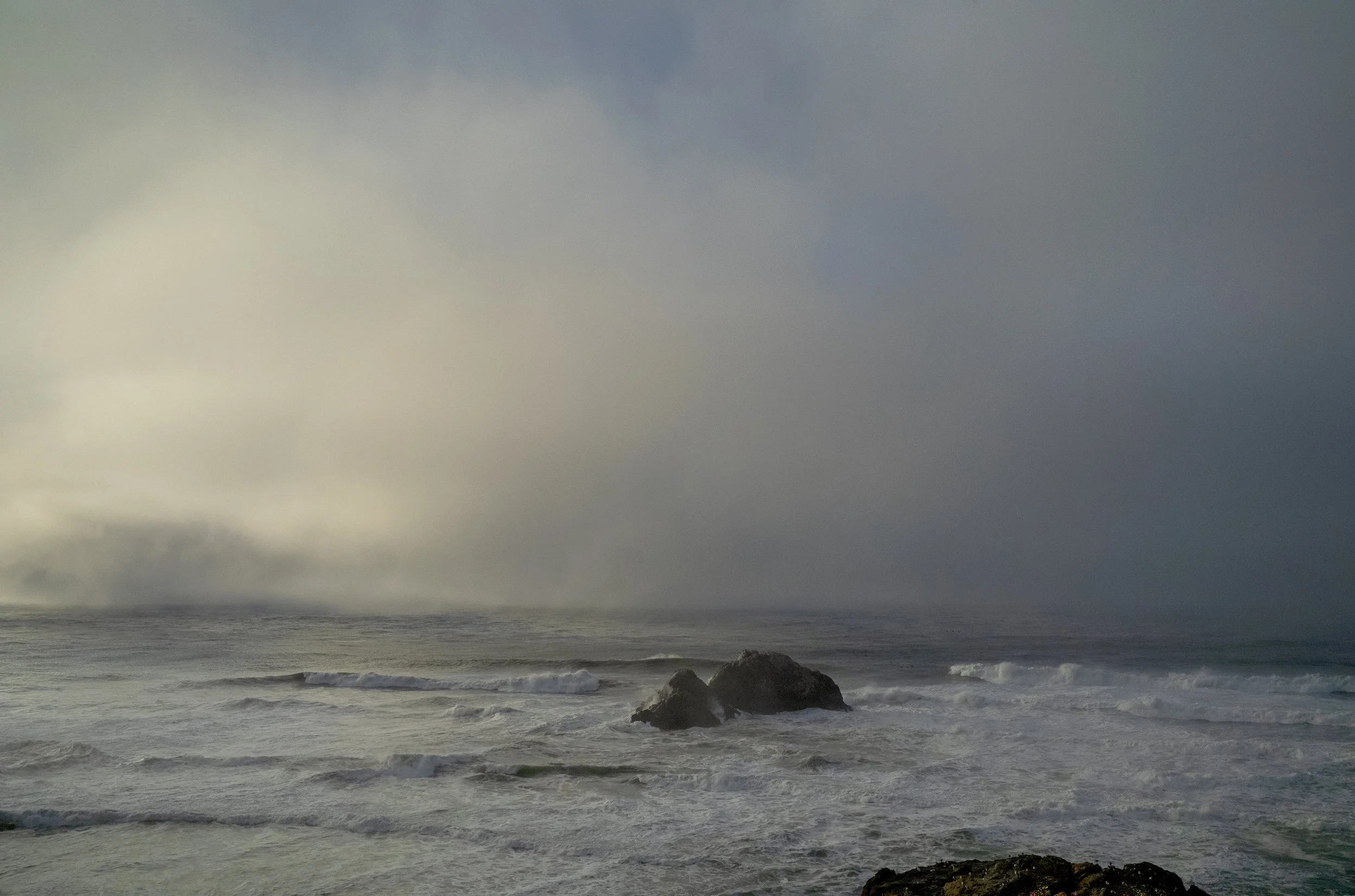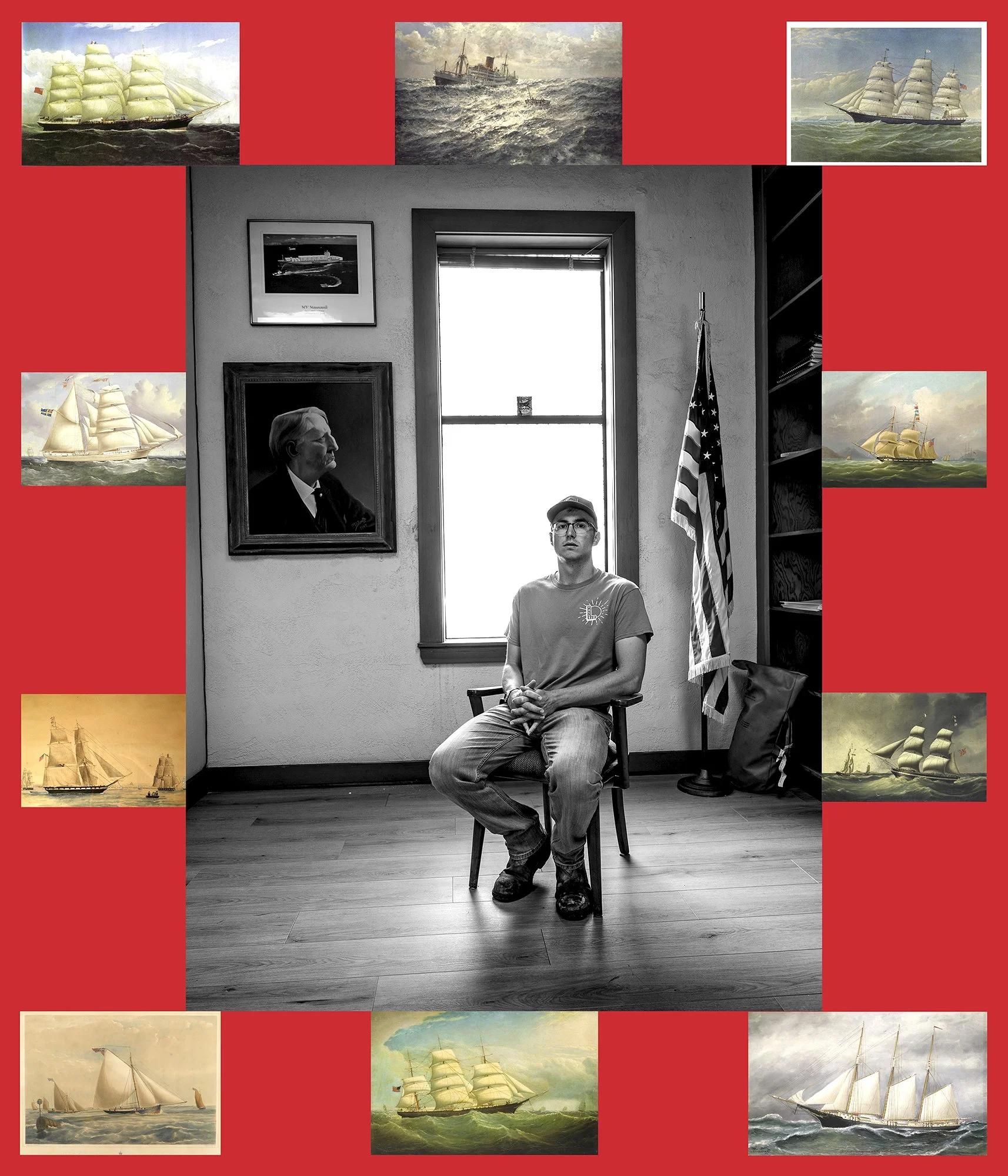11 November 2025
Lands End. San Francisco, California. 7 November 2025. Photo: Robert Gumpert
From the MMP Hiring Hall
Justin Storrs, 25. 3rd Mate
I am an officer so, I sail on any ship that will have me - container ships, Ro-Ros (roll-on/roll off) - I navigate, I work cargo, and when I’m not doing that I usually just work in the port. Just doing temporary stuff called night-mating, which is really fun.
[Night-mating is when] the ships come in that are part of our union and the guys want to get off and go home, see their families, get a drink, run errands. So, it’s a way for us, as a union, to take care of them. And take care of the watch. And make sure the ship is still safe. We take over the ship. We manage the cargo, and the lines so the guys can relax for the night. You’re releasing the watch, but you’re not sailing with the ship.
..
This last ship I was on I got a lot of shore time. It was a different type of ship, we weren’t moving any cargo. We were there for the military, and we were basically a floating warehouse in Busan (Korea).
I got off the ship every single day, and I was like a local, off the ship for like 5 to 6 hours a day.
But, on my other ships I barely got off. I wouldn’t get off the ships for months because I was tired, and I was working the midnight to 4 shift and there was no time. And there was COVID, so…
..
[On a 1000 foot container, the crew is] like 20 people. Three departments - you got the Steward’s department, the Engine department, and the Deck department.
The Steward’s department is in charge of your room - linens and stuff - food, making sure there’s enough provision for the ship wherever they’re going.
The Engine department is in charge of machinery - the main engine, the generators, the boilers, the bow thrust, anything [related].
The Deck department is responsible for cargo, navigation, and safety equipment
..
[The Chief Steward] is really important [for ship moral]. If you don’t have a good cook then I’m eating rice for the rest of my time.
I’ve been in mess decks, or the galley, where it’s only been the clinking of silverware because no one was talking. And, I’ve also been on ships where the Captain would sit, like, at the “kids” table, with the junior officers, and he’d be interested in what’s going on with out lives.
But, I really like when they cook really well ‘cause it’s such variety. Sometimes you get like Filipino chefs who cook really good Filipino food that I would never eat that off the ship; like good oxtail, sinigang soup, lumpia.
..
I really like it when you can watch a nice sunset, or see a beautiful rainbow. When it’s quiet out, and you’re doing you job and you’re not stressed out, and you know you’re getting down what you need to get done, you can drink coffee and look out the window.
And then on the flip side I really like it when very crazy out and it feels like you’re juggling like 30 different puzzle pieces. Like that crazy moment of we need to get the ship this port and there’s like a million fishing boats out there, and at the same time relaxing and drinking a cup of coffee.
..
Weather is not normally an issue. Weather systems, tracking and forecasts are getting so advanced that they just avoid all bad weather. The company contracts out another weather routing company, and that company will send us the best route for fuel efficiency - they’ll look at the waves, the pressure - then they’ll tell us the best route to take.
..
I really like going over to China because that was like the peak of my skills. Long nights, lots of traffic, and so many fishing boats, aggressive fishing boats. They would yell at you on the radio, shine lights at you, and shine lasers at the bridge. I always enjoyed that because it felt like that was when I was really using my skills.
I have the best of memories of the job working over there.
..
We pickup the Pilot at the Pilot station, and the time we get to the dock and tie-up, that can range from anywhere from an hour to 9 hours. When we were in Shanghai we have to go up the Yangtze River and that’s like an 8 hour pilotage. So from pickup the Pilot to mooring the ship, we are 8 or 9 miles up the river.
I think the ships would stay in port 12-20 hours at most. When they comeback here to the U.S. they’re here a little more because that’s when they’re picking up all their food, doing crew change over, and doing repairs.
..
I love the job, and I would keep doing it. But, my dad - he was in the military so, and he was always gone, deployed. I understand serving your country, you have to go. If world war three happened, God forbid, and they called me up to man one these ships, I would go.
[This job] the money is great. The time off is great, and I love the job, but I’m looking at maybe starting a family. I’m not saying you can’t do that while sailing, I know plenty of people that do.
But I’m just thinking I could probably make less money, budget, and still be on the water. Still use these skills somehow, and not be gone for that long. It took me awhile to figure that out, four years of school, and almost three years of sailing. I still work on the ships here in the port - I love night mating. I love seeing my friends who come in and I get to take the watch from them.
..
During COVID when a lot of the guys were retiring jobs were really plentiful. There were jobs on the open board, you didn’t even have to wait. You could just come in (to the hall) and say no one’s taking this job, I’m going to take it. For me, signing up for the union and being on a ship was less than a week. I come off that that ship, and comeback after my vacation and I get on another ship. It was really plentiful.
It depends on like the politics. If one administration wants to prioritize ship building, and build ships, then we might have more jobs [the effects of COVID retirements have abated].
Or we have prepositioned ships - those are like overseas floating warehouses so the military has supplies to, maybe a hot zone in case something broke out. But, you know, those ships cost a lot of money, so it’s a balance between having you’re gear, your supplies, money. So, it depends on the political climate of the time.
Then there is the Jones Act (The Merchant Marine Act of 1920, most recently revised in 2006). Probably if the Jones Act goes away I don’t think any of us will have a job because the Act puts in place a lot of measures to help and project U.S. shipping. I like to think, you have the military with bases all over the world - who are you going to trust to bring your supplies over there? If a war breaks out, who you going to trust to man these ships?
Justin Storrs, 3rd Mate
..
Photo: Robert Gumpert - 03 October 2025
Copies of “Division Street are still available! Order your copy from Dewi Lewis:
“Division Street” – Order from Dewi Lewis: Orders: U.S.A – Britain - Canada


